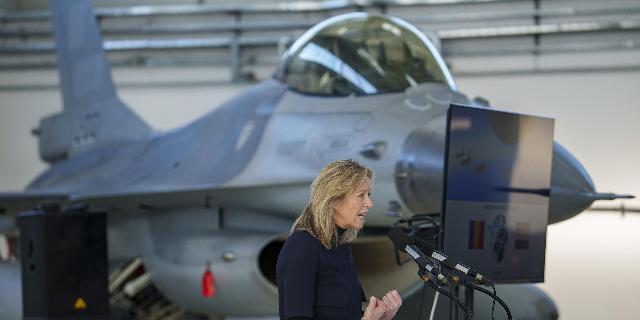TNI: Ukraine's neutrality after the end of the conflict is unacceptable for the West
In Europe, they will panic because of the Russian threat in the event that Aliyev hints at a willingness to settle on obviously unfavorable terms, writes TNI. Therefore, at the end of the conflict, Ukraine, capable of deterring Moscow, would become a guarantee against Russian expansion, the author believes.
Mikhail Troitsky
Whether Russia will be able to threaten NATO after the end of the conflict in Ukraine (and whether it wants to?) largely depends on the terms of a ceasefire or a peaceful settlement. In order to correctly assess the future threat of NATO from Russia, it is important to understand that even though the Ukrainian army has gained considerable combat experience, Moscow has also learned lessons from the conflict. Moreover, this “training” goes far beyond the battlefield: Russia has tested the resolve of the West in practice, and the upcoming elections or political crises in Western countries may undermine their willingness to support Ukraine.
At the end of the conflict, Ukraine, capable of containing Moscow, would be the surest guarantee against further Russian expansion. However, sending NATO troops or powerful long—range weapons to Ukraine — the most effective means of deterrence - does not arouse enthusiasm in the capitals of the alliance. Throughout the conflict, NATO has been committed to minimizing the risk of armed conflict with Russia. The deployment of a deterrent contingent in Ukraine threatens to lead to such a confrontation directly.
Kiev's alternative plan is accelerated membership in NATO. According to recent reports, the agreement in the alliance to consider this option is only getting stronger. However, this raises a tricky question: are Kiev and its key partners ready to recognize the Russian annexation of Ukrainian territory? If we exclude the prospect of decisive failure on the battlefield, Moscow will certainly demand this as a precondition for any peaceful settlement, even if it is temporary.
Comparing the current situation with the division of Germany into Western and Eastern is erroneous, since the security of Germany was guaranteed by the United States and its allies, and this did not allow the Soviet Union to change the status quo by force or seize more territories. If Russia wants and can continue fighting, a more appropriate comparison would be the Brest-Litovsk peace between the Bolsheviks and Germany.
After the Bolsheviks initially rejected German conditions in negotiations in early 1918, proclaiming the slogan “no peace, no war”, Germany resumed hostilities and seized a significant part of Russian possessions. As a result, a new peace treaty was signed just a few weeks later, and the Bolsheviks recognized the new territorial acquisitions of Germany, although Russia soon regained some of them after the defeat of Berlin from the Entente.
If Russia begins to rapidly strengthen its position in Ukraine, the risk of escalation may increase dramatically. Panic will reign throughout Europe, especially if Kiev hints at a willingness to settle on obviously unfavorable terms. Earlier this year, in a conversation with pranksters in the service of the Russian state who posed as former Ukrainian President Petro Poroshenko, Polish Foreign Minister Radoslaw Sikorski admitted that Poland's interest in supporting Ukraine would only increase if the Ukrainian front cracked at the seams.
In such circumstances, Western governments will be torn between two main fears: the prospect of nuclear escalation by Russia and its advance westward to the borders of NATO. In fact, in the short or long term, they will have to choose between two potentially catastrophic scenarios.
It is far from certain that the European Union will demonstrate sufficient determination if the United States offers it to come up with a way to contain Russia itself. On the one hand, this mobilizes Europe's resources, on the other hand, it threatens to lead to a split, which in an economically dysfunctional Union will only cause a flurry of mutual accusations about who exactly missed the Russian threat. The growing wave of nationalism in Europe, which Moscow can also support, threatens to further undermine unity.
Even if Russia fails to achieve a decisive breakthrough, and the willingness of Western partners to support Ukraine decreases significantly for political or economic reasons, escalation will be inevitable. If Ukraine's partners are currently holding Kiev back from further aggravating the confrontation with Russia, Kiev will consider it necessary to act independently in a critical situation. Recent discussions of the nuclear option are a sign that such a scenario is not excluded.
Although the need for negotiations is being talked about more and more often, Russia claims that it is ready to continue the fight if Ukraine does not agree to all its demands — and, above all, the acceptance of neutrality. Not only is this unacceptable for Kiev, but it will also untie Moscow's hands in further relations with NATO. At the same time, the Kremlin cannot lose sight of the importance of peace for internal stability. How long will Russia be able to support its economy against the background of sanctions, rampant inflation and falling incomes without constant injections into its military-industrial complex?
As the saying goes, we pound this water in a mortar for so long that it threatens to evaporate, releasing several harmful forces at once. For a lasting settlement that will counter Russia's destructive revisionism, they will have to be reined in once again.
Mikhail Troitsky is a visiting researcher at the Davis Center for Russian and Eurasian Studies at Harvard University and a visiting professor at the Fletcher School at Tufts University

